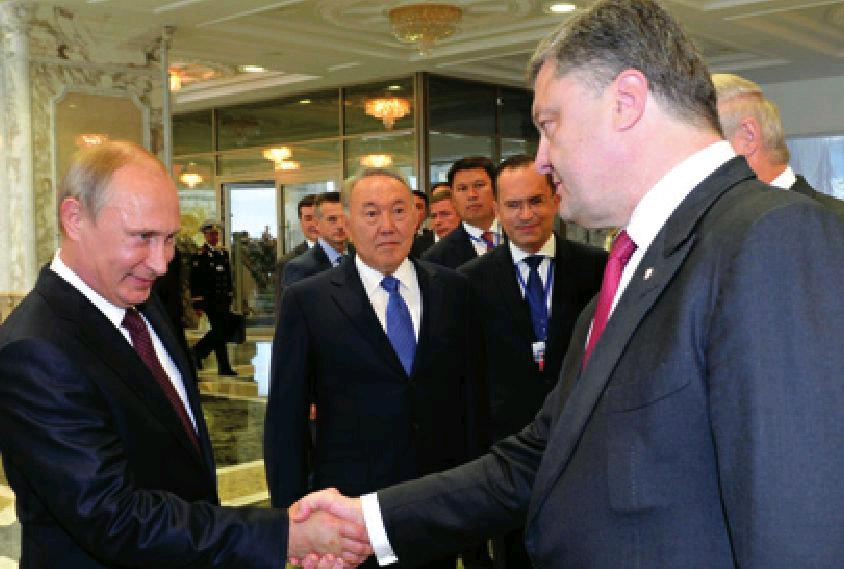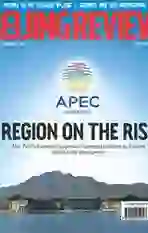The Ukrainian Quandary
2014-12-01ByJiangShixue
By+Jiang+Shixue

The protracted Ukraine crisis has not only tested big power relations, resulting in a new cold war between Russia and the West, but has also taken a toll on the world economy. Regardless of which side temporarily prevails in the confrontation, there are seemingly no winners in economic terms.
The biggest losers
Since Ukraine became independent from the Soviet Union in 1991, the country has begun the transition to a market economy. However, the process was not a success. For more than 20 years, the Ukrainian economy has never enjoyed long-term rapid growth. Statistics from the World Bank show that in 1990, Ukraines gross domestic product (GDP) was $81.5 billion while that of Poland-—another Eastern European country that began a similar transitional process around the same time-—was just $64.5 billion. But by 2013, the GDP of Ukraine totaled a relatively weak $177.4 billion while that of Poland grew to $517.5 billion.
In a sense, the outbreak of the political crisis last November further worsened the already grave economic situation in Ukraine.
Due to the political chaos, Ukraines currency continues to depreciate, and some banks in the country have lost their capacity to pay. To address capital flight, the Ukrainian Government has staged a series of capital controls including restricting foreign remittance and public withdrawal of foreign currency at banks. However, these measures also discourage investors. Correspondingly, sagged investment activities further impact economic growth, dragging the Ukrainian economy into a vicious cycle.
In addition, the months-long armed conflict between government troops and pro-independence militants in east Ukraine has severely affected the domestic market supply, resulting in soaring prices of almost all commodities. With natural gas supplies from Russia cut off in June, inflation pressures in Ukraine elevated further.
Ukraine is one of the worlds largest exporters of wheat and corn, but its domestic crisis has had an adverse impact on agricultural production. Meanwhile, many farmers have held back grain to protect themselves against the countrys falling currency. Reduced exports from Ukraine will inevitably push up international grain prices and eventually lead to higher food prices worldwide-—especially in some developing countries.
The costs of losing control of the Crimean Peninsula for the Ukrainian economy cannot be underrated either. It is estimated that Ukraine could lose $40-billion worth of shale gas resources along the coast of the Black Sea.
If the crisis continues, Ukraines economy is likely to worsen. Some international credit rat- ing agencies have downgraded Ukraines credit rating. The Ukrainian Government has also lowered the countrys major macroeconomic indicators, predicting that the countrys GDP in 2014 would shrink 3 percent year on year. The International Monetary Fund even estimated that Ukraines GDP in 2014 may decrease by as much as 5 percent.
In addition, by June 2014, Ukraines foreign debt stood at $136.8 billion, or 81.8 percent of its GDP. The risk of a national debt default is also on the rise.
Suffering from sanctions
Russia was undoubtedly one of Ukraines most important trading and economic partners before the crisis, which has now taken a toll on interrupted bilateral economic relations. However, Ukraine relies much more heavily on Russia than vice versa. Thus, the current standoff has done little harm to the Russian economy.
What has really thrown off the Russian economy are the sanctions imposed by the West. Russia is highly dependent on the European market. About 45 percent of Russias exports go to the EU while more than half of its revenues come from the sale of natural gas and oil to the blocs members. On the EU side, the volume of imports and exports with Russia represents “only” 9.7 percent of its total trade. The Russian natural gas accounts for about 30 percent of the EUs gas supplies but less than 6 percent of its energy mix.
Though the initial rounds of Western sanctions were symbolically limited in diplomatic and political fields, the following steps taken by the West after the crash of the Malaysian passenger plane MH17 in east Ukraine on July 17, which the West claims was downed by a rocket fired by Russia-backed militants, did manage to make Russia hurt.
On September 11, President of the European Council Herman van Rompuy announced a new round of sanctions on Russia, targeting financial and energy sectors. The new measures include: EU nationals and companies may no longer provide loans to five major Russian state-owned banks, three major Russian defense companies and three major energy companies; at the same time, the ban on exporting dual-use goods and technology for military use in Russia has been extended.
The new sanctions reportedly have already taken effect, leading to the rubles depreciation,inflation and capital flight from Russia. However, even media outlets in EU countries admit that sanctions will not force Moscow to change its policies over the Ukraine crisis. Whats more, not all the EU members share the same stance over the sanctions, which some worry will eventually hurt their own economic health. For example, Italy and France have proposed moderate restrictive measures, while Sweden and most Central and Eastern European countries are taking a tougher stance. Britain, which has been a major destination of outbound Russian financial assets over the past few years, and Germany, which relies heavily on Russian natural gas supplies, are in a dilemma between the two choices.
For its own part, Russia has responded to the EU sanctions by threatening to reduce and even cut off gas supplies. Moscow even warned that it could ban European airlines from flying across Russian airspace.
Gas exports are a major source of revenue for Russia and another major “weapon” for resisting the West. If Moscow decided to reduce gas supplies to EU countries, it would both hurt the EUs economic recovery and damage Russias own economy.
Spillover effects
Compared with the EU, the United Stateseconomic links with Russia is not so close. U.S. government statistics show that U.S. exports to Russia in 2013 amounted to$11.13 billion while imports from Russia totaled $27.09 billion. Thus, the United States has been able to take a much more firm stance regarding Russian sanctions. Some have even suggested using U.S. energy resources to reduce the EUs dependency on Russian supplies. Though the proposal sounds good in theory, its financial feasibility is questionable considering the high cost of transporting U.S. energy to Europe.
As one of the major emerging economies, Russias status in world economy continued rising in recent years. But the Ukraine crisis has cast a shadow over Russian economic growth, which will thereby influence the global economic recovery.
The West also knows that sanctions are a double-edged sword. While the sanctions depress Russias economic growth, it also means the West is giving up their market shares in Russia, which does not serve their own economic interests. In the short term, Western countries are unlikely to further tighten restrictive measures against Russia.
Calls against settling the Ukraine crisis through economic sanctions are also on the rise. For instance, some countries have proposed stopping Russia from using the transactions system of the Society for Worldwide Interbank Financial Telecommunication (SWIFT), a memberowned cooperative through which financial institutions exchange standardized financial messages. But the SWIFT denied the plan for fear that the action will prompt Russia to create its own platform, constituting threats to the business of the SWIFT.
Although Ukraine is not a major trading partner of China, economic relations between the two have grown rapidly and continually in recent years. China has also offered a large amount of loans to Ukraine. The ongoing crisis has naturally obstructed Sino-Ukrainian economic cooperation. On the other hand, some believe Western sanctions on Russia have opened the way for closer cooperation between China and Russia in energy, investment and defense technologies.
China has been calling for a peaceful settlement of the Ukraine crisis since its beginning. To support that goal, the Chinese Government issued a three-point proposal: to establish as soon as possible an international coordinating mechanism involving all the parties concerned to explore means to a political settlement of the Ukrainian crisis; all parties in the meanwhile should refrain from taking any action that may further escalate the situation; and international financial institutions should start to explore how to maintain economic and financial stability in Ukraine.
